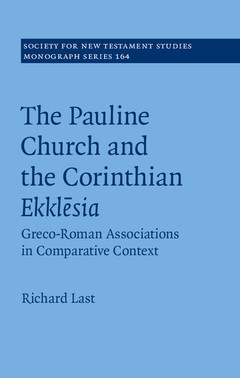Description
The Pauline Church and the Corinthian Ekklesia
Greco-Roman Associations in Comparative Context
Society for New Testament Studies Monograph Series
Author: Last Richard
This innovative volume is the first English-language monograph to compare Paul's Corinthian church with contemporary cult groups from Mediterranean antiquity.
Language: English
Subject for The Pauline Church and the Corinthian Ekklesia:
Approximative price 111.54 €
In Print (Delivery period: 14 days).
Add to cart
Publication date: 11-2015
Support: Print on demand
Support: Print on demand
Description
/li>Contents
/li>Biography
/li>
Moving past earlier descriptions of first-century Christ groups that were based on examining the New Testament in isolation from extant sources produced by analogous cult groups throughout Mediterranean antiquity, this book engages with underexplored epigraphic and papyrological records and situates the behaviour of Paul's Corinthian ekkl?sia within broader patterns of behaviour practised by Greco-Roman associations. Richard Last's comparative analysis generates highly original contributions to our understanding of the social history of the Jesus movement: he shows that the Corinthians were a small group who had no fixed meeting place, who depended on financial contributions from all ten members in order to survive, and who attracted recruits by offering social benefits such as crowns and office-holding that made other ancient cult groups successful. This volume provides a much-needed robust alternative to the traditional portrayal of Pauline Christ groups as ecclesiastically egalitarian, devoid of normative honorific practices, and free for the poor.
Introduction; 1. Greco-Roman associations as an analytic category; 2. House and ekklēsia; 3. Two economically modest associations; 4. The costs of ekklēsia survival; 5. Keeping up with the θιασωται; 6. Strengthening the weak; 7. The election and crowning of officers; Conclusion; Appendix: a reply to Timothy Brookins.
Richard Last is a Banting Postdoctoral Fellow in the Department of Humanities at York University, Toronto. His articles have appeared in journals such as the Harvard Theological Review, New Testament Studies, and the Journal for the Study of Judaism.
© 2024 LAVOISIER S.A.S.




